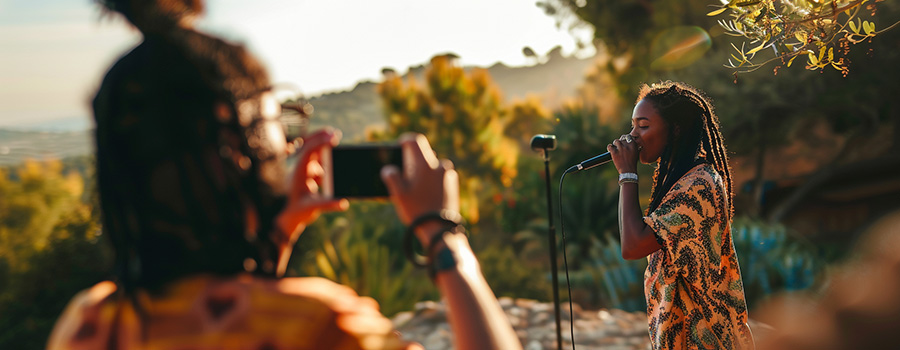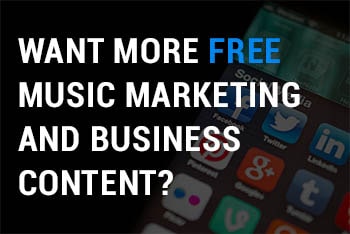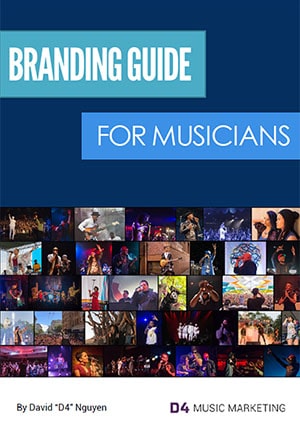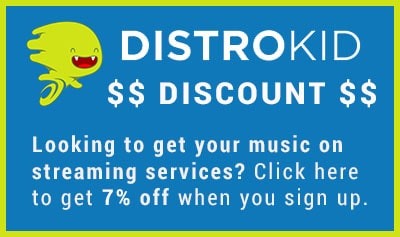
The generally accepted norm in the music industry is that you never promote your older songs once new music has been released. I understand that artists don’t want to live in the past and revisit older music. As an artist grows and evolves, it’s more exciting to promote what’s new and current.
Many artists, especially more established ones who have been in the industry before social media and algorithms were even a thing, are hesitant to promote older songs. Not only do they feel it’s a bad look, but they think fans only want to hear new material.
If you’re in the middle of a campaign to promote a new release, your focus should be solely on that. However, you may have down periods that present a perfect opportunity to try something like this.
In this blog, I’ll will share my 8 reasons why we should challenge this old way of thinking and suggestions on how to go about promoting older music to reach new fans.
To be clear, when I talk about promoting older songs, I’m talking about creating content like short-form performance videos focused on reaching newer audiences. However, it can also include sharing backstories of a song and behind-the-scenes videos to engage current fans.
1. We live in a totally different content climate.
We’re not in the 20th century anymore where communication, media and entertainment operated much differently. Traditional media (TV, radio, film, print) had their corporate gatekeepers for their respective content channels. With limited ways to share art and communicate, content was scarce because it was expensive to produce. Plus, distribution to a wider audience was not accessible to the average person.
For the music industry, you had gatekeepers who decided who was put on and what was marketable to the masses. The mindset was to push the new hot thing to get people to buy records and tickets for shows. It was a cyclical cycle that still goes on today. Because music distribution was controlled and commercial music was relatively scarce, it made more sense not to push older songs.
But then the internet, digital downloads, smartphones and social media platforms changed everything for the next 2 decades.
Communication and access to information became democratized. Individuals have become empowered to become their own media companies and build businesses. This ultimately took the power away from the mainstream (traditional media channels) and created a fragmented online landscape of different interests, hobbies and passions.
In this new climate where most music doesn’t follow so tightly with mainstream culture anymore as it once did pre-Internet, there’s no reason not to promote your older songs. After all, there will always be people who have never been exposed to your music, which ties into the next point. With all these changes, it is fair to question and challenge many of these norms and taboos around how musicians should operate.
2. Your music is always to new someone.
The online landscape has become fragmented with so many different niches, communities and pockets of interest that go below the mainstream radar. We now have very popular musicians in one particular segment of music that most people still never heard of.
This is why there’s always someone out there who has never heard your music. So any old song of yours will be brand new to them.
Usually, your current fans are the ones who would expose these people through word of mouth. Otherwise, they may discover it passively through playlists or algorithms that recommend your music.
Instead of depending on these passive methods, it would be better to be proactive and create specific content to promote your older hits.
3. Not all fans were there with you from the beginning.
The assumption many artists make is that fans know all your music and only want to hear new material. With so many different touch points online and opportunities for discovery, the reality is that people will become fans at various points of your career. This was true in the past, but even more so now.
Despite your entire discography being easily accessible in the age of streaming, not everyone will want to dig into every project, especially if you have a lot of music.
There’s always a chance newer fans may have missed certain projects of yours, even popular ones. Even though the main objective of promoting older songs is to reach those who haven’t heard your music yet, some of your current fans may appreciate it. Your day-one fans may also enjoy the nostalgia as well.
4. Marketing needs to focus on bringing in new fans.
It doesn’t always make sense to lean heavily on new, unproven songs to promote music to reach new fans. If you have popular songs in your older catalog, it would be smart to leverage those tracks instead. Set aside a budget for social content or even paid ads using your proven hits to draw in new potential fans on a regular basis.
Any successful business needs to focus on bringing in new customers, but also keeping customers coming back. The way I see it, new music is generally focused on engaging your current customers/fans. On the other hand, your older proven hits, and even deep cuts, are focused on attracting new customers/fans into your ecosystem.
Or to use marketing speak, your proven songs are ideal for the top of the funnel, the awareness stage, to draw in new potential fans. Your new music is to engage your current fans and generate interest that could lead them to action (i.e. buy tickets to the upcoming tour).
Otherwise, it’s much harder to sustain as a business if you rely solely on your current fans to get your name out there and buy tickets and merch regularly. You need consistent growth to be sustainable. I’m seeing this issue firsthand with the independent artists I work with now.
5. Producing songs/albums is expensive so maximize your investments.
From an artistic perspective, albums are great and important bodies of work that often define your career and legacy. But from a business standpoint, we should reevaluate how we promote them.
Many fans don’t understand how much producing albums can cost with producers, paying other musicians, studio engineers, graphic designers, mixing & mastering engineers, etc. This is why singles are more lucrative. You get more out of each song by giving it undivided attention.
Typically, you only have 2 – 4 lead songs that are focused on in the promotion for an upcoming album. All the other songs you’re just hoping people will listen through once the full-length project is released to the public.
The attention a new album has in today’s climate, even for the biggest stars, is 1 or 2 weeks. After that, it’s on to the next big thing.
For an independent artist who has spent $20,000 to $30,000 to make an album, that’s a big gamble. You’ll have to hope touring and selling merch will allow you to get your return on investment.
So if there are inexpensive ways to easily promote and bring attention to songs from older albums and songs that didn’t get the same attention in the initial rollout, why not do it years later? Again, with so much content saturation, there’s no reason not to give it a shot and maximize the mileage for something you’ve already paid to make.
6. You need consistent content for marketing.
Many musicians hate the word ‘content’ because it minimizes and devalues their art, but it is now a core part of the business and marketing. The fact is content marketing is a numbers game. The more quality content you post regularly, the better you do on social media. It’s a competitive landscape so consistency is the key to grabbing your share of attention in newsfeeds.
Typically when there’s new music or an album, social media posts increase. This lasts for a few months to promote singles and eventually the album. You have tour and merch posts to monetize the new material in hopes of recouping the cost of recording the new album. Once that cycle is over, then what?
If you want to continue to keep your fan base engaged while trying to earn new ones, you want to keep content flowing regularly even if there’s nothing new to promote.
This is particularly true if you want to take advantage of organic reach and have the algorithm on your side. What better time to post videos and draw attention to older songs people already love?
7. You don’t know until you try. What’s the worst that can happen?
The fear many musicians have is that revisiting older material may draw criticism. First, you’re not going to lose fans for doing so. Second, if you do, then they’re not the fans you want. There’s always going to be that one snobby, entitled fan who may leave a comment but who cares.
Just like with anything in life, you don’t know if something is going to work until you give it a good try. This may require reevaluating certain outdated beliefs.
So much of marketing and promotion in business requires some willingness to experiment or try something new. If the majority of the music business is still stuck in the past, why not try something that not everyone is doing?
Which older songs to use?
Let’s say I have convinced you to give this tactic a shot. How should you go about approaching this? Which older songs should you start with?
Your proven hits. Your best songs are more likely to attract new potential fans. Also, videos using your hits are more likely to motivate your current fans to share that content too. This is particularly great for running ad campaigns to create awareness.
Use data from streaming platforms. Look at your streaming data to see if other songs in your catalog have performed very well that were not singles. It’s possible that you have a deep cut that fans naturally love. On Spotify, the more obvious songs are the ones that have made it into your popular songs list on your profile and you’ve never promoted as a single or made a video for it.
Ask fans. Get your answer directly from fans. Ask them in a social media post. On Instagram Stories, use the question box or poll stickers to get ideas.
Get feedback from fan communities. Whether it’s on Reddit, Discord or Facebook Groups, fans are often talking about you. You may not have time stiff through all the different conversations so maybe have someone do it for you. I came across this thread on a subreddit from one of my favorite artists that would have been a gold mine of ideas for which older songs to promote.
What’s trending? If there’s a certain topic trending or a cultural moment is happening and you have a relevant song, make a short-form video performing that song. Maybe there’s a cover song that’s getting a lot of attention and you have a cover of the same song.
Album/song anniversaries. If it’s the 10th anniversary of a song or album, breathe life back into it by creating some short-form videos. For those worried about criticism, this gives you the perfect excuse to cover all the songs, even the non-singles.
Tie your song to a calendar event. Make videos using songs that have an easy association with a calendar event (i.e. Rebecca Black’s Friday, Valentine’s Day, 4/20 or even Christmas) and post it on those days.
Conclusion
It doesn’t matter what stage of your career you’re in, you should always continue to promote your catalog as part of your overall marketing strategy, especially your proven hit songs.
The exception is if you’re a global superstar and can easily afford to wait comfortably only to put out new music every couple of years. But even then, there’s nothing wrong with staying top of mind in such a content-saturated, attention-scarce world.
Otherwise, for the independent, middle-class artists who have worked hard to get to where they’re at, you should consider revisiting older songs in a fun and easy way. Especially with short-form performance videos being popular, it has become a cost-effective way to promote older material on social media. If done right and consistently, the algorithm on platforms like TikTok, Instagram Reels and YouTube Shorts will constantly push your video content to new potentially fans for you.
The Moral of the Story: If you want to keep growing sustainably as a business, you need to focus on expanding your fan base by using assets you have available, especially older hit songs. With so much competition for attention in this digital age, you want to make sure you can engage your base regularly but also attract new fans.








If I wanted to release a song that I would have to copyright that’s apart of a future album, can I just copyright the whole album and then release the single or do I have to copyright the song and album separately ?